The J. J. Ebers Award was established in 1971 to foster progress in electron devices. It commemorates Jewell James Ebers, whose contributions, particularly to transistors, shaped the understanding and technology of electron devices. It is presented annually to one or more individuals who have made either a single or a series of contributions of recognized scientific, economic, or social significance in the broad field of electron devices. The recipient is awarded a certificate and check for $5,000, presented at the International Electron Devices Meeting.
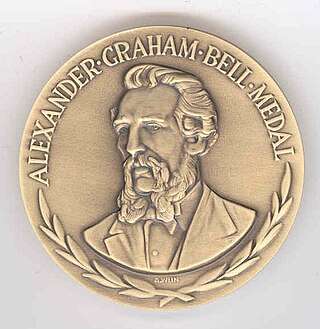
The IEEE Alexander Graham Bell Medal is an award honoring "exceptional contributions to communications and networking sciences and engineering" in the field of telecommunications. The medal is one of the highest honors awarded by the Institute of Electrical and Electronics Engineers (IEEE) for achievements in telecommunication sciences and engineering.
The IEEE Lotfi A. Zadeh Award for Emerging Technologies is a Technical Field Award of the IEEE for contributions to emerging technologies. The award is named after the US-Azerbaijani mathematician Lotfi A. Zadeh. The award was established by the IEEE Board of Directors in 2000, replacing the prior IEEE Morris N. Liebmann Memorial Award.
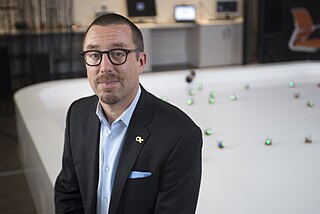
Magnus B. Egerstedt is a Swedish-American roboticist who is the Dean of the Henry Samueli School of Engineering at the University of California, Irvine. He was formerly the Steve C. Chaddick School Chair and Professor at the School of Electrical and Computer Engineering, Georgia Institute of Technology.
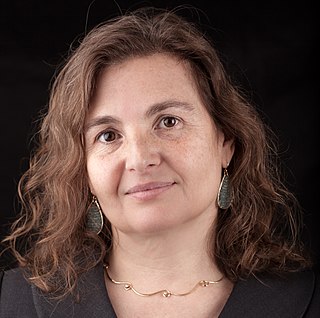
Daniela L. Rus is a roboticist and computer scientist, Director of the MIT Computer Science and Artificial Intelligence Laboratory (CSAIL), and the Andrew and Erna Viterbi Professor in the Department of Electrical Engineering and Computer Science (EECS) at the Massachusetts Institute of Technology. She is the author of the books Computing the Future and The Heart and the Chip.
The IEEE Robert N. Noyce Medal is a science award presented by the IEEE for outstanding contributions to the microelectronics industry. It is given to individuals who have demonstrated contributions in multiple areas including technology development, business development, industry leadership, development of technology policy, and standards development. The medal is named in honour of Robert N. Noyce, the co-founder of Intel Corporation. He was also renowned for his 1959 invention of the integrated circuit. The medal is funded by Intel Corporation and was first awarded in 2000.
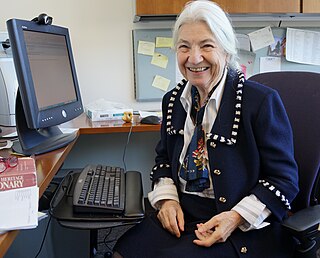
Ruzena Bajcsy is an American engineer and computer scientist who specializes in robotics. She is professor of electrical engineering and computer sciences at the University of California, Berkeley, where she is also director emerita of CITRIS.

Cynthia Dwork is an American computer scientist best known for her contributions to cryptography, distributed computing, and algorithmic fairness. She is one of the inventors of differential privacy and proof-of-work.
The IEEE Jack S. Kilby Signal Processing Medal is presented "for outstanding achievements in signal processing" theory, technology or commerce. The recipients of this award will receive a gold medal, together with a replica in bronze, a certificate and an honorarium.
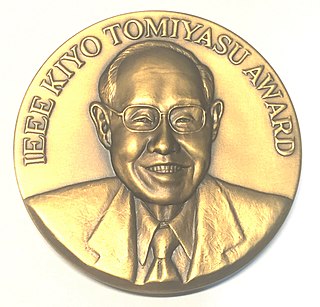
The IEEE Kiyo Tomiyasu Award is a Technical Field Award established by the IEEE Board of Directors in 2001. It is an institute level award, not a society level award. It is presented for outstanding early to mid-career contributions to technologies holding the promise of innovative applications. The prize is sponsored by Dr. Kiyo Tomiyasu, the IEEE Geoscience and Remote Sensing Society, and the IEEE Microwave Theory and Techniques Society (MTT).
Maja Matarić is an American computer scientist, roboticist and AI researcher, and the Chan Soon-Shiong Distinguished Professor of Computer Science, Neuroscience, and Pediatrics at the University of Southern California. She is known for her work in human-robot interaction for socially assistive robotics, a new field she pioneered, which focuses on creating robots capable of providing personalized therapy and care that helps people help themselves, through social rather than physical interaction. Her work has focused on aiding special needs populations including the elderly, stroke patients, and children with autism, and has been deployed and evaluated in hospitals, therapy centers, schools, and homes. She is also known for her earlier work on robot learning from demonstration, swarm robotics, robot teams, and robot navigation.
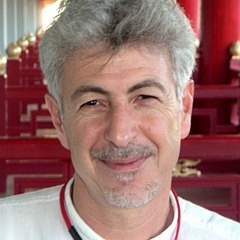
Oussama Khatib is a roboticist and a professor of computer science at Stanford University, and a Fellow of the IEEE. He is credited with seminal work in areas ranging from robot motion planning and control, human-friendly robot design, to haptic interaction and human motion synthesis. His work's emphasis has been to develop theories, algorithms, and technologies, that control robot systems by using models of their physical dynamics. These dynamic models are used to derive optimal controllers for complex robots that interact with the environment in real-time.
Bradley James Nelson is an American roboticist and entrepreneur. He has been the Professor of Robotics and Intelligent Systems at ETH Zurich since 2002 and is known for his research in microrobotics, nanorobotics, and medical robotics.
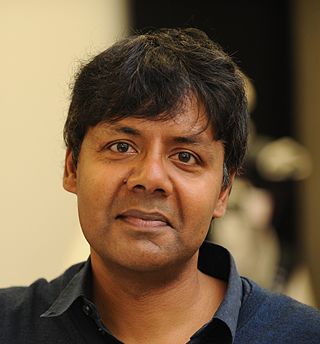
Sethu Vijayakumar FRSE is Professor of Robotics at the University of Edinburgh and a judge on the BBC2 show Robot Wars. He is the Programme co-Director for Artificial Intelligence at The Alan Turing Institute, the UK's National Institute for Data Science and Artificial Intelligence, with the responsibility for defining and driving the institute's Robotics and Autonomous Systems agenda. He co-founded the Edinburgh Centre for Robotics in 2015 and was instrumental in bringing the first NASA Valkyrie humanoid robot out of the United States of America, and to Europe, where is it a focus of research at the School of Informatics. He was elected as a Fellow of the Royal Society of Edinburgh in 2013.
Sushil Jajodia is an American computer scientist known for his work on cyber security and privacy, databases, and distributed systems.

Margarita Chli is an assistant professor and leader of the Vision for Robotics Lab at ETH Zürich in Switzerland. Chli is a leader in the field of computer vision and robotics and was on the team of researchers to develop the first fully autonomous helicopter with onboard localization and mapping. Chli is also the Vice Director of the Institute of Robotics and Intelligent Systems and an Honorary Fellow of the University of Edinburgh in the United Kingdom. Her research currently focuses on developing visual perception and intelligence in flying autonomous robotic systems.
Berkshire Grey, Inc. is an American technology company based in Bedford Massachusetts that develops integrated artificial intelligence (“AI") and robotic solutions for e-commerce, retail replenishment, and logistics. The company's systems automate pick, pack and sort operations.

Bruno Siciliano is an Italian engineer, academic and scientific popularizer. He is professor of Control and Robotics at the University of Naples Federico II, Chair of the Scientific Council of the ICAROS Center, and Coordinator of the PRISMA Lab at the Department of Electrical Engineering and Information Technology. He is also Honorary Professor at the university of Óbuda where he holds the Rudolf Kálmán chair.

John Kenneth Salisbury, Jr. is an American Roboticist and Research Professor Emeritus at Stanford University’s Computer Science Department and Stanford School of Medicine’s Department of Surgery. Salisbury is a researcher in the fields of robotics, haptics, and medical robotics. He is an inventor of over 50 patents and recipient of the 2011 IEEE Inaba Award for "Commercialization of Products in Medical Robotics, Robotics, and Haptics".










